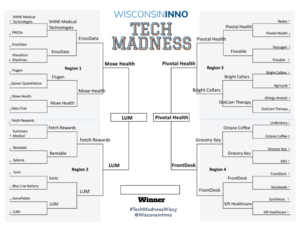
As the U.S. startup ecosystem begins to extend away from the coasts and mature in the middle part of the country, investors are looking to cast a wide net to capture the next wave of innovation — by promoting cooperation with its neighbors to the north, in Canada.
On March 24, Wisconsin Inno gathered regional business leaders for a virtual roundtable to discuss the growing number of cross-border collaborations designed to seed the landscape and accelerate startup growth in both countries, including those gaining traction in Wisconsin.
Kira Lafond, market president and publisher of the Milwaukee Business Journal, which publishes Wisconsin Inno, moderated the discussion, which highlighted the importance of cooperation between the international business allies and detailed successful partnerships already taking root.
Lafond was joined by Wayne Robson, acting Consul General of Canada in Chicago; Joan Schmit, American Family Insurance Distinguished Chair in Risk, University of Wisconsin School of Business; and Dan Reed, managing director at American Family Ventures, who served as the event panelists.
The event kicked off by emphasizing the importance of the two countries' trade relationship.
The panelists discussed how the pandemic is affecting the current business landscape, especially as the countries look to maintain cooperation between borders, prioritize its integrated supply chains, and control the virus.
“Currently the Homeland Security and Canadian border crossing agencies that are involved with this, as well as public health, have extended non-essential crossborder travel limitations through April 21,” Robson said.
Prior to the pandemic, there were about 400,000 border crossings a day, he said. Now, they average about 2% of that total, or about 8,000. Business crossings have remained relatively the same, though testing requirements and quarantine measures are still in place. Despite the drop, essential travel continues to flow.
“No two nations depend more on each other for their mutual prosperity than Canada and the United States,” Robson said. “We both benefit from our longstanding foreign policy and security relationship, but really the trade relationship is what underpins it all.”
Robson pointed to the strength of the countries’ supply chains, its commitment to fighting climate change, and the stability of North American energy markets, as additional areas of shared interest, noting that Canada remains the United States' “biggest customer,” when it comes to trade.
Canada and the United States conduct about $2 billion in trade each day, including about $1 billion of that around the Great Lakes, he said.
The number is equivalent to “ … an armored car worth of money going back and forth [across the border] every minute,” Robson added. “Canada bought more goods from the U.S. in the last year than China, the (United Kingdom) and Japan combined. That relationship is really vibrant and really important.”
The Consulate provides a Trade Commissioner Service, which connects Canadian business contacts with American networks to facilitate business partnerships, free of charge, he said.
One example of these partnerships includes encouraging American participation in Collision, billed as one of the world’s biggest tech conferences, held in Toronto in spring. The event brings together startups, investors and other technology thought leaders, attracting nearly 40,000 attendees.
Another example is working with incubators and accelerators, such as the Creative Destruction Lab.
While the nonprofit startup accelerator, founded at the University of Toronto, operates in nine international locations (including five sites in Canada) and offers more than a dozen streams and resources to support early-stage ventures — including agriculture, blockchain, energy and commerce — the program recently launched at the University of Wisconsin-Madison, this past summer.
CDL-Wisconsin, a partnership between the university and American Family Insurance, launched its inaugural stream around risk management across society, combining the expertise of the school’s top-ranked risk and insurance program at the UW-Madison School of Business, and the technical capabilities of its departments in the School of Computing, Data and Information Sciences to spur innovation in the Insurtech space.
The program hosted 20 ventures that participated in intensive full-day sessions with CDL mentors to establish their growth goals every eight weeks. The startups attend meetings with investors to learn about opportunities to raise capital, and receive technology roadmap assistance and business support through various school and business partnerships.
About 12 of the ventures made it to the fourth session round.
American Family's Schmit serves as the program’s co-leader, and said trade between the U.S. and Canada is just as intellectual, as it is material.
“The idea is that the students may get jobs with these startups or develop their own entrepreneurial spirit,” Schmit said. “The opportunity to work with computer science, to enhance our entrepreneurship at the University of Wisconsin, and then to work with CDL, it’s an amazing organization.”
She adds expanding opportunities and access for innovation to take place outside of regions such as Boston or the Bay Area, and promoting cross-border partnerships, is necessary to combat a saturation of experience and investment that continues to fuel existing tech ecosystems, like Silicon Valley.
That’s one of the reasons why Reed says American Family Insurance has been investing in startups in and around the insurance industry for the better part of a decade, including the Dairy State.
“Since the insurance industry has been transforming itself from the inside and outside, we’ve been casting a fairly wide net as far as where we engage with these concepts and founders that can help define how insurance works over the next decade,” Reed said. “Increasingly, there’s been a trend in the early stage startup space about other places.”
While Reed noted the company maintains a presence in Silicon Valley, increasing prices in the waterlogged region have made it tougher to make a great return on investment as an investor. As more communities across the country and the globe build up their startup ecosystems and reach maturity, American Family Insurance expects to follow suit. He cited gener8tor’s expansion across the Midwest, as an example.
Similarly, Canada holds promise as a next hub of investment, he said.
“My journey with Canada started with a trip sponsored by the Consulate,” Reed said. “For me, it was surprising. You think about all the blind spots you have as an investor and the maturity of Toronto and Waterloo ecosystem as far as startups and opportunities to invest, it candidly sort of shocking to me.”
Reed noted he was impressed by the tech-corridor’s advancements in artificial intelligence and invested in a company in the Canadian region. He started working with CDL’s founder, Ajay Agrawal, on the economics of AI and the effect of prediction capabilities on the insurance industry, and credited his work with Agrawal, Schmit and the University of Wisconsin on driving CDL’s risk stream. Agrawal founded CDL in 2012.
Schmit said the success of the CDL program at the university has led the partners to expand the startup accelerator to include a health stream, and will soon be inviting ventures to participate. The program is focused on undertaking a “resilience” concept that fits both the health and risk streams.
“So much in insurance right now is mitigation, or preventing loss, and that’s what [sponsors] are indicating as well,” Schmit said. “You can’t talk about health care, certainly in the United States, without also talking about how to finance. So, I imagine there’ll be some connections between the two.”






